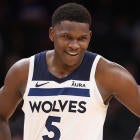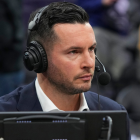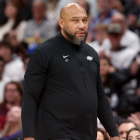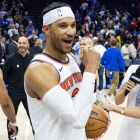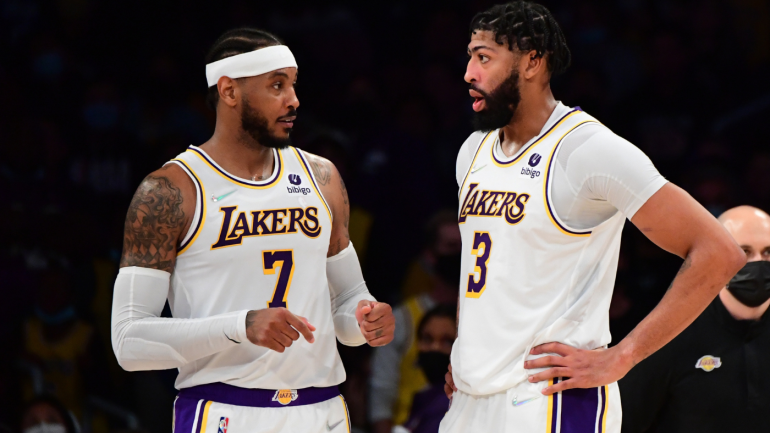
The Los Angeles Lakers earned an impressive victory over the Washington Wizards on Sunday, defeating their first opponent since a right foot injury knocked Anthony Davis out for the next month by a score of 119-117. Merely getting the win was impressive. The Lakers have struggled in minutes without Davis all season. But let's not lose perspective here. They beat the Wizards. Every team that has faced the Wizards in December has beaten them. Things are going to get a good deal harder from this point forward. On Monday, the Lakers travel to Phoenix to take on the Suns.
Beating the Suns is a good deal harder than beating the Wizards. Many difficult opponents await the Lakers, and considering the Lakers were under .500 with their MVP candidate, they're going to be at an enormous disadvantage without him. So what can they do about that? Well, the Lakers still have an empty roster spot. They have all of the trade assets they had a week ago, and they have internal lineup changes they can consider. So what sort of moves are available to the Lakers as they try to stay afloat without Davis?
1. Trades
Any lingering hope you might have held onto for Myles Turner or Buddy Hield, for the time being, should be gone. If the Lakers weren't going to trade for them when Davis was healthy and thriving, they're not going to trade for them now that he's out and the season is on the brink. This should be the expectation for any other big-ticket trade trade targets right now. The unspoken truth of this Lakers season is that the front office was never going to devote future assets to improving this team until it proved it deserved to be improved.
Most would say it had done so. Since starting the season 2-10, the Lakers are 11-6 with wins over some of the NBA's best teams and near-misses with several others. Davis was playing All-NBA basketball and LeBron James hasn't been far off. But none of that matters at the moment because the team has been so reliant on Davis that the possible reality of his absence might be something like a 19-30 record when he returns. It doesn't matter how good Davis is if the Lakers fall out of the playoff race without him. So for now, it's probably safe to assume that those often-discussed first-round picks aren't moving.
But they aren't the only assets the Lakers have. Between Patrick Beverley and Kendrick Nunn, the Lakers have over $18 million in expiring salary to turn into usable depth. That's not going to get them much, but teams with longer-term contracts clogging up their books would probably love to use the Lakers as an escape hatch. Here are a couple of deals that might be possible without significant draft capital involved.
- The Lakers have been linked to Evan Fournier and Cam Reddish of the Knicks. Such a deal makes sense for both sides. Fournier has another year on his contract that the Knicks would love not to pay. Neither he nor Reddish has been in the rotation for their recent winning streak. Fournier is a very strong shooter. Reddish would fill a major hole by providing size on the wing. Michael Scotto of HoopsHype reported a week ago that the Lakers actually wanted draft capital from the Knicks to make this sort of deal and take on Fournier. Might they soften that stance now?
- The Lakers were interested in Terry Rozier this offseason, but The Athletic's Shams Charania reported that Rozier's availability would be "predicated on the franchise's direction for the future and its play as the season goes on." Well, the Hornets are 7-23 and have the worst record in the Eastern Conference. If they can get out of Rozier's long-term contract for nothing but expiring salaries, they might consider it.
- There hasn't been any reporting on his availability, but the Miami Heat would probably love a mulligan on the Duncan Robinson contract. His playing time has been yanked around all season and he's shooting just 32 percent from deep. Might the Lakers consider taking a chance on him? Or would the three years remaining on his deal after this one scare them off?
For now, a trade of any sort is probably not especially likely. These moves would help this season but deprive the Lakers of the cap flexibility they could currently carry into the offseason. They'd have to believe that the gains would be great enough to offset the opportunity they'd lose to overhaul in the summer. None of these deals appear strong enough to do so.
2. Free agents
When the Lakers waived Matt Ryan earlier in December, they did so seemingly hoping to retain roster flexibility for a trade. Maybe a trade comes and maybe it doesn't, but they have a roster spot open right now. That theoretically gives them room to consider a free agent if there is anyone they believe to be worth signing.
Should they look at big men with Davis out? Thomas Bryant gave them 33 minutes in Sunday's win over the Wizards. That's probably a bit much, but the Lakers can get to 48 between Bryant, Damian Jones and Wenyen Gabriel when he returns. Watch out for them to play LeBron James at center a bit as well. They did so extensively last season and have toyed with the lineup this season.
If they want another big, two options stand out. DeMarcus Cousins is the name that will inevitably come up. He's available. He's a former Laker. Darvin Ham spent some time with him in Milwaukee a season ago, so he'll have a good idea of what to expect. But he's unsigned for a reason: Cousins is a complete defensive liability that hasn't always been easy to integrate into locker rooms. A lower-key option would be South Bay Laker Jay Huff, averaging 3.4 blocks with 38.5 percent shooting from deep in the G-League. The Lakers tend to do well developing players in South Bay. If they want another big, Huff would be the internal candidate.
More likely, they'd prefer another forward. That will be especially true if James is playing minutes at center. Pickings are slim there. If they weren't, well, the Lakers would've signed someone by now. They were thin at forward even before Davis got hurt. The obvious name here is Carmelo Anthony. He comes with some of the same concerns as Cousins: solid upside on offense, but a disaster on defense, and while he has widely been regarded as a good teammate, his stature in the league practically demands playing time. It's hard to bring in a player like Anthony and not give him 20 minutes per night whether or not he deserves it. Still, the Lakers needed shooting before Davis went down, so it wouldn't be the worst idea to bring Anthony back and try to win with offense for the next few weeks.
3. Lineup changes
Patrick Beverley missed Sunday's game due to a calf injury, but his absence pushed Austin Reaves into the starting lineup. That should probably remain the case moving forward. Ham has insisted on starting Beverley despite most numbers suggesting that he shouldn't, and the Lakers would frequently win games in the minutes he sat. In Friday's win over the Nuggets, the Lakers lost the minutes he played by 11 points, but won the 27 minutes he sat by 29. The Lakers could afford to start slowly when Davis was playing. They can't now. Reaves tweaked his ankle in the win over the Wizards, but if he's healthy, he almost has to start moving forward.
It's also somewhat notable that Russell Westbrook did not play the final seven minutes and change against Washington. That's not surprising. It was a bad game for him: nine points, three turnovers, only 33 percent shooting, but it remains somewhat jarring to see a second-round rookie like Max Christie close a game over him. The truth is that he should be regardless of how Westbrook plays. The Lakers have lost Westbrook's fourth-quarter minutes by 78 points this season and won their fourth-quarter minutes without him by 66.
These are not changes tied directly to Davis. They are improvements that need to be made based on his absence. Whatever margin for error the Lakers had last week is now gone. They have to optimize every minute if they are going to survive this stretch. This roster was flawed before Davis went down. It's practically broken without him.














